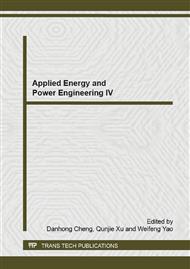p.1572
p.1576
p.1580
p.1586
p.1595
p.1600
p.1609
p.1614
p.1621
Optimization Control of Engine Working Points Adjustment for HEV Bus
Abstract:
In order to adjust the working points of the engine for a full hybrid bus, this paper proposed a set of optimization control method. In speed adjustment process, the rate of change was optimized and limited to avoid rapid and frequent change along with power required by the driver. Allow for complex engine model, fuzzy control method was introduced to regulate the torque response rate. Furthermore, dynamic amplitude upper and lower bound were limited to prevent system overshoot and oscillation. Nowadays, there are hundreds of busses operates in several public transport lines. Vast statistic data and experimental results verify the feasibility and effectiveness of the proposed control method in this paper. The vehicle has good fuel economy compared to the counterpart one, and the dynamic performance is also greatly improved.
Info:
Periodical:
Pages:
1595-1599
Citation:
Online since:
December 2014
Authors:
Keywords:
Price:
Сopyright:
© 2015 Trans Tech Publications Ltd. All Rights Reserved
Share:
Citation:


